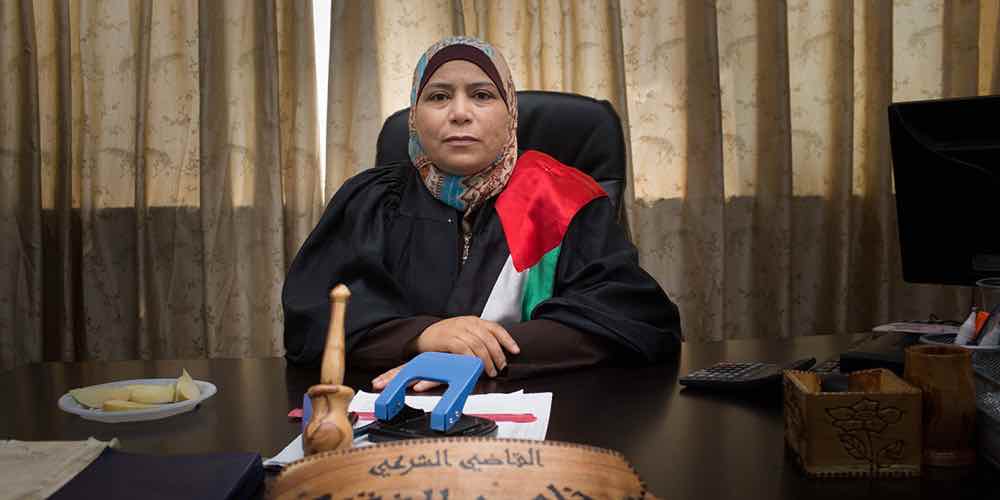Documentarian Erika Cohn discusses making a film about Judge Kholoud Al-Faqih, encouraging dialogue, telling a character-driven story, and questioning cliches.

Erika Cohn’s second feature follows Judge Kholoud Al-Faqih, the first woman judge in the Shari’a courts not only in Palestine, but in the whole Middle East. Although women judges have existed for a while in other parts of the legal system in the Middle East, the Shari’a Court — which applies rules based on the Quran to conclude on proceedings regarding family matters such as marriages and divorces — was exclusive to men until 2012. That year, Kholoud managed to convince Palestine’s Chief Justice that nothing in the Quran forbids women to be Shari’a judges. Despite the protests of many, she became the first woman Shari’a judge in the Middle East, and has been focusing her efforts on making women more aware of their rights ever since.
But getting women appointed as Shari’a Court judges is only the first step in Al-Faqih’s ongoing efforts toward creating a more egalitarian Palestine. Despite the new rules in the courts, she is still confronted everyday with people who disapprove of her reading of the Quran — or simply find women too emotional to handle any serious matters. For most Western viewers, it would seem completely fair to get angry in that situation, yet both judge and director demonstrate a patience and tolerance that is testament to their strength and determination.
The Judge avoids sentimentalism and sticks to the facts, which are powerful and unfamiliar enough on their own to grab the attention. In so doing, the film counters, with a disarming and refreshing pragmatism, many of the cliches about the place of women in Islam, the ways women in the Middle East respond to oppression, and the ways in which they are free.
After the film’s premiere in TIFF Docs, The Seventh Row talked with Erika Cohn about encouraging dialogue, telling a character-driven story, and questioning cliches.
Seventh Row (7R): How did the project come about?
Erika Cohn: I was on shooting hiatus with my last film, In Football We Trust (2015). I had a Rotary Ambassadorial Scholarship in Israel/Palestine to teach film and continue my postgraduate research in Islamic feminism. Through a dear friend and colleague, I was invited to a Shari’a law reform meeting in Ramallah, in the West Bank. During this meeting, the question of raising the marriage age, polygamy, and the difficulty of Palestine’s legal challenges were being addressed.
All of a sudden, this woman walked in and everyone stood up to greet her. I wondered “who is this person?!” She had this amazing command of the room and this beautiful presence that radiated everywhere. I listened to her speak throughout this meeting, and I thought, “She’s just unbelievable. Where did she come from?” I kept wanting to know more and more about her.
[clickToTweet tweet=”‘She had this amazing command of the room and this beautiful presence that radiated everywhere.'” quote=”‘She had this amazing command of the room and this beautiful presence that radiated everywhere.'”]
After the meeting, we had a chance to meet. When she found out I was a filmmaker, she told me she’d been wanting to have a film made, to help inspire women and girls around the world to take leadership roles in their communities, despite cultural norms or traditions. She invited me to see her one day at the court, and that was the beginning of it all, in 2012.
[clickToTweet tweet=”‘She’d been wanting to have a film made, to inspire women and girls to take leadership roles.'” quote=”‘She’d been wanting to have a film made, to inspire women and girls to take leadership roles.'”]
7R: It’s amazing that she had already thought of having a movie made about her and the power this could have.
Erika Cohn: I think it was important to her. I very much wanted to make a film about her. She’s an incredible person. But typically, as filmmakers, we are pursuing something that matters. To have that serendipitous encounter where we were both, in a way, looking for each other was a beautiful thing.
7R: Was it easy getting access to her and to the other judges, especially the more high profile men?
Erika Cohn: Because she wanted to have the film made, it was easy to get access to her courtroom. However, I had to go through a very bureaucratic process to gain access to the other courts from the Chief of Justice. That was a very laborious process.
I think the reason why they gave me the permission to film, in the end, was that they thought I wouldn’t be able to do much anyway: I was just this woman who kind of speaks arabic and carries a tiny little camera. I seemed unthreatening to them. It’s kind of crazy to see how far it’s come.
[clickToTweet tweet=”‘I was just this woman who kind of speaks arabic and carries a tiny camera. I seemed unthreatening.'” quote=”‘I was just this woman who kind of speaks arabic and carries a tiny camera. I seemed unthreatening.'”]
7R: So many of these people you interview are very opposed to the concept of a woman Shari’a judge. From our Western point of view, they seem really misogynistic. How did you deal with that, and how did you decide how much of them to include in a film that is clearly on her side?
Erika Cohn: We have the major opinion with the interview with Dr. Husam Al-Deen Afanah, who very much opposes women having any kind of judicial or official role in the courts. My approach in interviewing him was trying to really understand his argument. I wanted to get to the root of it. It wasn’t a judgmental interview at all.
Regarding the people on the street, we had dozens and dozens of interviews. That was very hard because I wanted to show a diversity of perspectives in Palestine. It’s just like any other place: there’s diversity of opinions in the US, in Canada, in Europe, everywhere.
What was surprising to me was, for example, the women in the bar. One of them loves the idea of having a woman judge, and the other says that it’s scientifically proven that women are too emotional for those roles. But I think that people felt very comfortable in sharing their opinions. It didn’t feel like I was intruding.
7R: What is really striking in the film is how it does not aim to reach the viewer with emotions and sentiments at all, even though it would be largely accepted today to be infuriated by this unfairness. Did you have a moment where you made a conscious decision to address this issue in a cool-headed way?
Erika Cohn: That’s a really good question. What I wanted to do was provide a platform for this conversation to be had. I really didn’t want to impose my beliefs into this film. I wanted it to be a standalone piece. I wanted it to be a film that could resonate with a plethora of different opinions, which could allow people to come together and have a dialogue.
[clickToTweet tweet=”‘I wanted a film that resonated with a plethora of opinions, which could allow people to have a dialogue.'” quote=”‘I wanted a film that resonated with a plethora of opinions, which could allow people to have a dialogue.'”]
7R: Do you think that ever since Kholoud became a Shari’a judge, the people are actually changing their minds by seeing her there?
Erika Cohn: There are different ways to approach this question of women judges. From an Islamic scholarly perspective, having a woman there allows for other women to do the same. It creates a precedent.
I think people still disagree because it’s a matter of interpretation. There are so many interpretations of Islam, just like every other religion. When you’re dealing with religious text, it all depends on which interpretation is being used.
Shari’a differs so much based on time and place, from region to region. Even though Palestine was able to have this, it may be that in Jordan women are still not allowed to be judges in their Shari’a courts.
I think that even if some people in Palestine disagree, they’ve accepted the fact that they have a woman Shari’a judge. But it’s still very controversial.
7R: Had you already finished the film at the moment when a client dies in Kholoud’s court? [A mentally unstable husband killed his wife in the waiting room.]
Erika Cohn: No, we had not finished the film. But in a cinema verité film, you have no idea how the project is going to turn out, where the storyline is going to go, or what a character’s narrative arc is going to be.
[clickToTweet tweet=”‘In a cinema verité film, you have no idea how the project is going to turn out’ – Erika Cohn” quote=”‘In a cinema verité film, you have no idea how the project is going to turn out’ – Erika Cohn”]
That event really changed the trajectory of the film. It also propelled Kholoud’s efforts and gave her the opportunity and the desire to do the petition [asking for the retirement of Chief Justice Sheikh Yousef Al-Dais, who was responsible for the unstable man being present in the court].
7R: You said you studied Islamic feminism. In the film, however, you focus on the practicalities of the situation. You don’t talk about theory.
Erika Cohn: I’m a filmmaker first and foremost, and I’m driven to tell stories about characters. Cinema verité films and films that address social justice topics very much appeal to me. My studies on the Middle East helped to give background information.
But in filmmaking, we immerse ourselves in whatever our film is about for years. During that time, you become a scholar of whatever your movie is about. My last film, In Football We Trust, was about football and the Pacific Islander. I’ll give you any statistics about the Pacific Islander and football. For The Judge, I think that my background research really just provided a better context for me to be able to tell a very character-driven story.
[clickToTweet tweet=”‘We immerse ourselves in whatever our film is about for years. You become a scholar of whatever your movie is about.'” quote=”‘We immerse ourselves in whatever our film is about for years. You become a scholar of whatever your movie is about.'”]
7R: In the US and in the western World, there is this view that everyone in the Middle East sees women as inferior, including women themselves. But The Judge shows a woman fighting for women’s rights, from within the judicial system and from within the country.
Erika Cohn: I wanted to challenge the Western perception that women in the Middle East accept this situation. And this is an example that the news media doesn’t really portray. Women actually are taking on social issues and taking matters into their own hands.
[clickToTweet tweet=”‘I wanted to challenge the Western perception that women in the Middle East accept this situation.'” quote=”‘I wanted to challenge the Western perception that women in the Middle East accept this situation.'”]
It’s like Kholoud says in the film at one of the meetings, “We need to be our own advocates.” We have to be at the forefront of social change. We don’t need outsiders’ help, we need to do it ourselves.
[clickToTweet tweet=”‘It’s like Kholoud says in the film at one of the meetings, ‘We need to be our own advocates.”” quote=”‘It’s like Kholoud says in the film at one of the meetings, ‘We need to be our own advocates.””]
7R: What is your next project, and is it also focused on women?
Erika Cohn: It is. It’s a feature documentary called Belly of the Beast, chronicling the journey of women fighting reproductive injustice in their communities in the US.
Read all of Seventh Row’s TIFF ’17 reviews and interviews here >>

